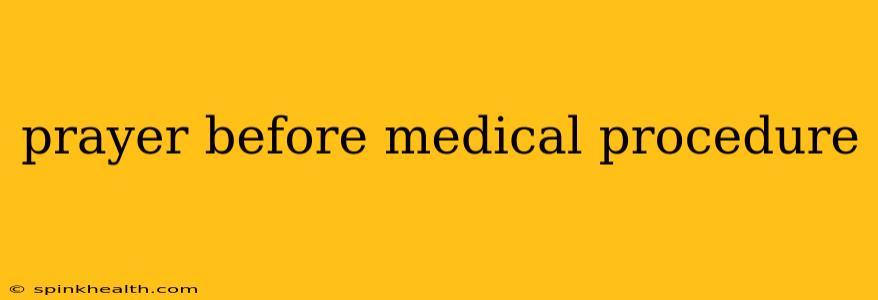A Prayer Before a Medical Procedure: Finding Solace and Strength
The sterile scent of antiseptic, the rhythmic beeping of machines, the hushed whispers of medical professionals – these are the sounds and sensations that often accompany a medical procedure. For many, these moments are fraught with anxiety, fear, and uncertainty. But within that apprehension, a quiet space opens for faith, hope, and prayer. This isn't just about religious belief; it's about finding solace, strength, and a sense of peace in the face of the unknown.
This article explores the power of prayer before a medical procedure, offering insights and examples to help you navigate this challenging time. We'll also delve into frequently asked questions surrounding this deeply personal practice.
What is the purpose of praying before a medical procedure?
The purpose of prayer before a medical procedure is deeply personal and varies from person to person. For some, it's a way to connect with a higher power, seeking guidance, comfort, and strength. Others may pray for healing, for the medical team's expertise, or for a positive outcome. Still others might simply find solace in the act of prayer itself, a moment of quiet reflection amidst the storm of emotions. Regardless of the specific intention, the core purpose is to find peace and a sense of control in a situation often characterized by its unpredictability.
Imagine Sarah, a woman facing a complex surgery. Her prayer might be a heartfelt plea for healing and a successful operation. John, on the other hand, facing a less serious procedure, might offer a prayer of gratitude for the medical advancements that make the procedure possible and for the skilled hands of the medical professionals. Both prayers are equally valid and powerful.
What should I pray for before a medical procedure?
There's no right or wrong way to pray. Your prayer can be a simple, heartfelt expression of your feelings, or a more formal, structured invocation. Consider praying for:
- Healing: Ask for physical and emotional healing for yourself or a loved one.
- Guidance: Seek divine guidance for the medical team, asking for wisdom, skill, and clarity.
- Strength: Pray for strength for yourself and your loved ones to face the challenges ahead.
- Peace: Ask for peace of mind and a sense of calm amidst the uncertainty.
- Gratitude: Express gratitude for the medical professionals and the resources available.
You can adapt these suggestions to create a prayer that resonates deeply with your personal beliefs and experiences. Consider including specific details about your situation, or simply express your hopes and fears in your own words.
Can prayer help with the anxiety associated with a medical procedure?
The calming effect of prayer can significantly alleviate anxiety. The act of prayer itself can be a form of mindfulness, focusing your attention on something beyond your immediate worries. This shift in focus, combined with the sense of connection and hope that prayer provides, can be profoundly therapeutic. For many, prayer offers a sense of surrender and acceptance, lessening the burden of fear and uncertainty.
However, it's important to note that prayer is not a replacement for medical care. While it can offer significant emotional support, it shouldn't be seen as a substitute for seeking professional medical advice and treatment.
What are some examples of prayers before a medical procedure?
Here are a few examples to inspire your own prayer:
Example 1 (Simple): "God, I place myself in your hands. Grant me peace and strength for this procedure. Guide the hands of the doctors and nurses. Thank you for your love and protection."
Example 2 (More detailed): "Dear Lord, I come before you today with a heart full of hope and some trepidation. I pray for a successful outcome for this procedure. Bless the doctors and nurses with wisdom and skill. Give me strength to face whatever lies ahead. I trust in your divine plan and your unwavering love. Amen."
Ultimately, the most effective prayer is the one that comes from your heart. It’s a personal conversation with your faith, a source of comfort and strength during a challenging time. Remember to embrace the power of prayer, alongside medical care, as you navigate your journey.

